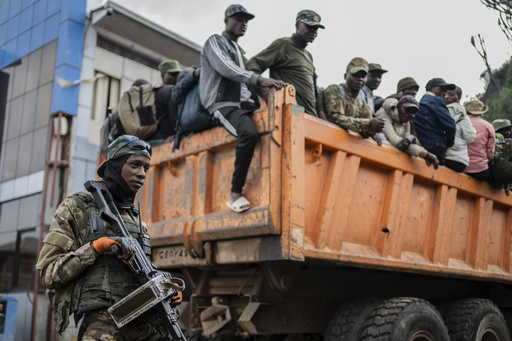KINSHASA, Congo — This year has seen over 7,000 fatalities as M23 rebels, allegedly backed by Rwanda, have made significant territorial gains in the mineral-dense eastern region of Congo. On Monday, Congo’s Prime Minister Judith Suminwa Tuluka addressed the U.N. Human Rights Council, declaring that the security and humanitarian crisis in this area has escalated to “alarming levels.”
The conflict has intensified in recent weeks, with the M23 rebels seizing the critical city of Goma in January and then Bukavu, another important provincial capital, this month. The M23 group stands out among the numerous armed factions vying for control in eastern Congo, a region rich in untapped mineral resources essential for global technology needs.
With growing concerns surrounding Rwanda’s actions, Kaja Kallas, the European Union’s chief diplomat, affirmed that Congo’s territorial integrity is “non-negotiable.” In response to the situation, EU defense dialogues with Rwanda have been halted, including cooperative missions in Mozambique and the ongoing review of a memorandum of understanding concerning vital raw materials.
A year prior, the EU and Rwanda established an agreement aimed at fostering sustainable supply chains for critical raw materials, highlighting Rwanda’s ability to produce tin, tungsten, gold, and niobium, alongside its potential for mining lithium and rare earth elements.
This EU decision comes on the heels of Congo’s government accusing Rwanda of pillaging its wealth, particularly after the U.S. recently called for an “immediate cessation” of mineral sourcing from areas under M23 control. As tensions rise, Rwanda has yet to respond, and the potential repercussions for its economy loom large.
The United Nations has issued warnings that the ongoing violence poses a broader risk to the region, which has endured decades of conflict, leading to the displacement of millions. The M23 has articulated ambitions to overthrow Congolese President Félix Tshisekedi’s administration in distant Kinshasa, a city that has historically struggled to exert control over the eastern provinces. Despite urgent calls for a ceasefire, the rebels continue their advances, reportedly fortified by approximately 4,000 Rwandan troops stationed close to Goma.
Leaders of the M23 have declared their intent to “cleanse” urban centers of poor governance and insecurity, with Uriva now within their sights, as gunfire was reported there over the weekend. The M23 claims it is defending ethnic Tutsis and Congolese of Rwandan descent against alleged discrimination and envisions the transformation of Congo from a failed state to a modern nation.
Analysts, however, have critiqued these justifications as mere covers for Rwanda’s involvement. In Goma, witnesses have recounted that M23’s intelligence units are hunting for former Congolese soldiers and criminals, but they have misidentified some individuals during their operations. Reports indicate that 11 young people were killed on Sunday while awaiting a weightlifting class, mistakenly labeled as thieves.
